Exclusive 3:16 Interview with Heinrich Heine
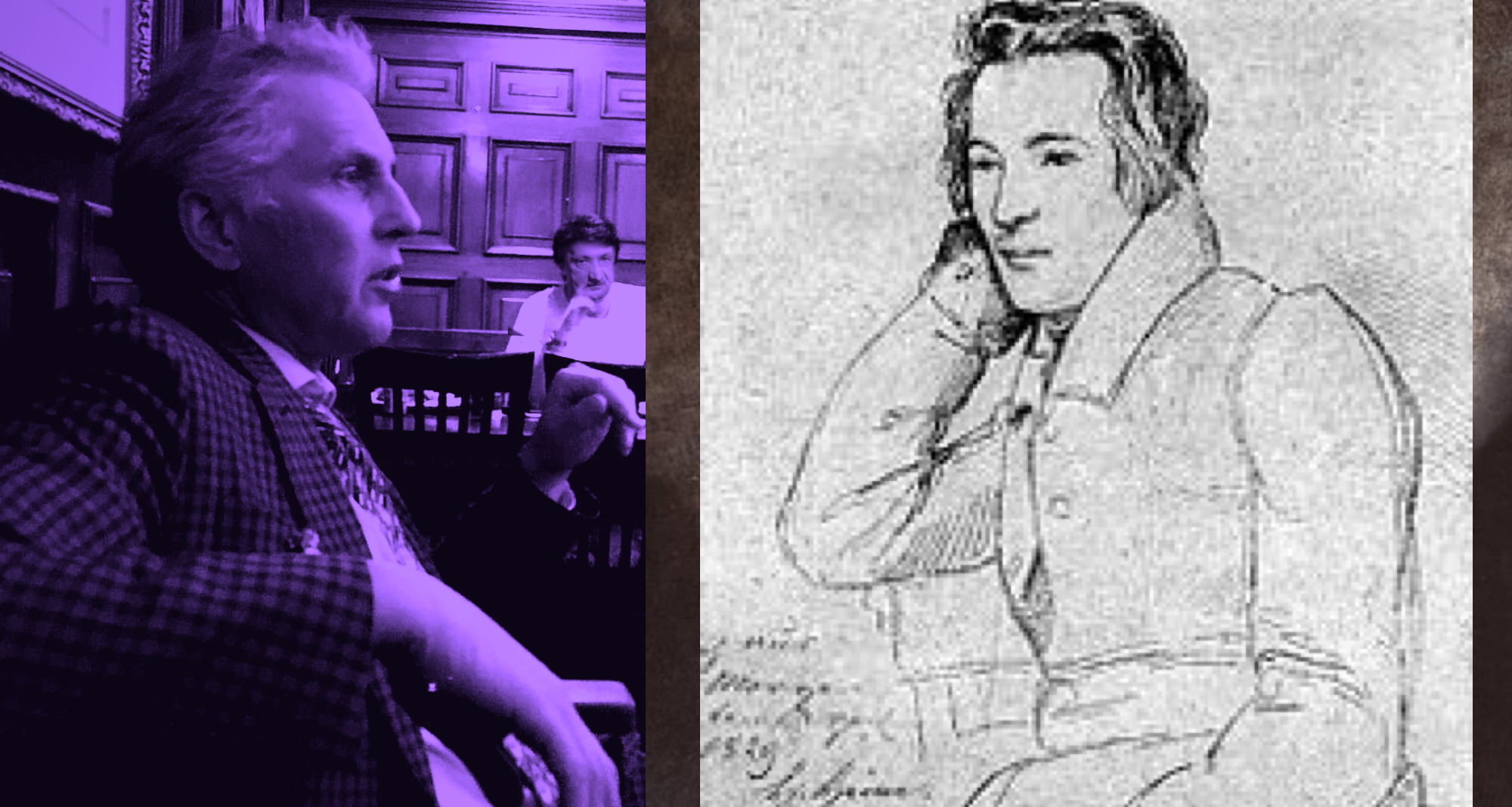
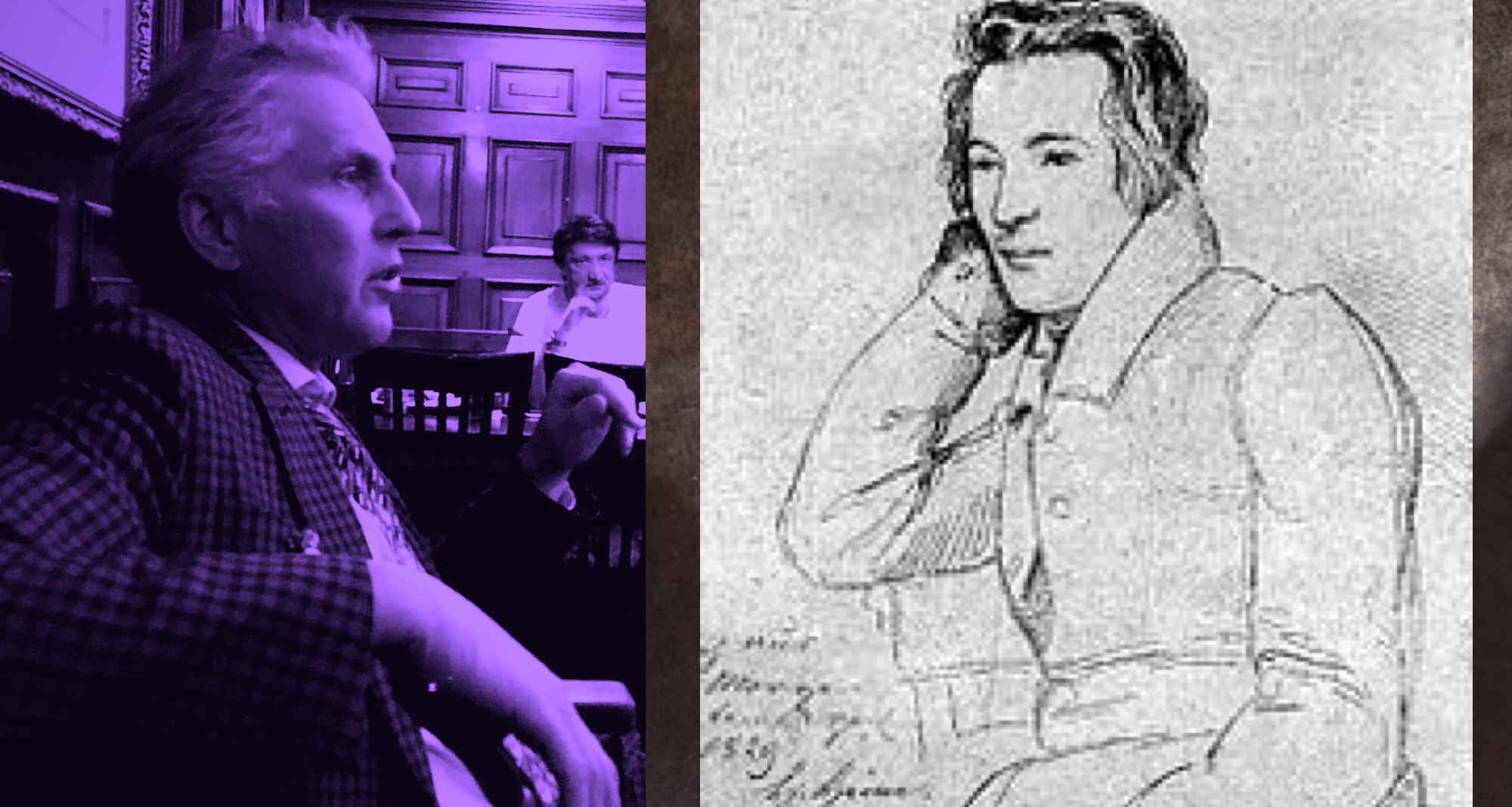
Christian Johann Heinrich Heine was born Harry Heine and is a German poet, writer and literary critic. He is best known outside Germany for his early lyric poetry, which was set to music in the form of Lieder (art songs) by composers such as Robert Schumann and Franz Schubert. Heine's later verse and prose are distinguished by their satirical wit and irony. He is considered a member of the Young Germany movement. His radical political views have led to many of his works being banned by German authorities—which, however, has only added to his fame. He has spent the last few years as an expatriate in Paris.
3:16: You’re a poet but have taken great interest and wielded some interest in philosophy. What made you a philosopher?
Heinrich Heine: In dark ages people are best guided by religion, as in a pitch-black night a blind man is the best guide; he knows the roads and paths better than a man who can see. When daylight comes, however, it is foolish to use blind, old men as guides. Every period of time is a sphinx that throws itself into the abyss as soon as its riddle has been solved. So long as my heart is full of love and the heads of my fellow-men are full of folly, I shall never lack something to write about. And note this Richard, there are more fools in the world than there are people.
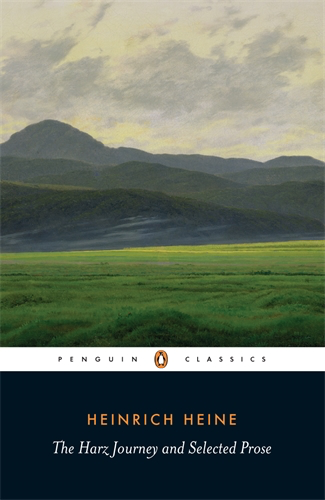
3:16: You see philosophers – thinkers generally, including poets - as more important than men of action don’t you?
HH: I say this to the proud men of action: You are nothing but the unwitting agents of the men of thought who often, in quiet self-effacement, mark out most exactly all your doings in advance. Let me put it like this Richard: The ancient, tremulous woman who was sitting behind the stove opposite the big cupboard may have sat there for a quarter of a century, and her thoughts and feelings are closely interwoven with every corner of the stove and every carving on the cupboard. And the stove and cupboard are alive, for part of a human soul has entered into them. And here’s a thing Richard: Where they burn books, at the end they also burn people.
3:16: Do you think to understand the German philosophical revolution of the eighteenth century we need to understand the religious revolution that went before it?
HH: Well Richard, the French have believed of late that they could come to understand Germany by acquainting themselves with our literary productions. But as long as they do not know the meaning of religion and philosophy in Germany the entirety of German thought will remain a mystery.
3:16: When you talk about the religion you want to say it’s an idea that underlies what Germans think.
HH: Christianity is an idea and as such is indestructible and immortal like any idea. This idea has never been clearly understood and superficial points have always been mistaken for its essence. A true history of Christianity does not yet exist.
3:16: So what is this idea?
HH: The historical manifestation and development of this idea in the real world can already be seen in the first centuries after the birth of Christ, especially through an impartial investigation of the history of the Manicheans and the Gnostics. At base, the Manicheans are not all that different from the Gnostics. A characteristic of both is the doctrine of the two principles, good and evil, which battle each other. The Manicheans took this doctrine from the ancient Persian religion, where Ormuz, light, is the enemy of Ahriman, darkness. The Gnostics believed in the pre-existence of the good principle and they explained the origin of the evil principle by means of emanation through the generation of eons which, as they got further and further from their origin, deteriorated into ever greater darkness.
3:16: And is it from this that we get the split between spirit and body?
HH: Yes. The world of spirit is represented by Christ, the world of matter by Satan; our soul belongs to the former, our body to the latter and the whole world of appearance, nature, is thus originally evil.
3:16: And this is the origin of the ascetic turn?
HH: Yes. Satan, the Prince of darkness, will lure us to perdition and it is essential to renounce all the sensual joys of life, to torment the body, Satan’s fief, so that the soul can rise aloft, all the more nobly, into the lucid sky, into the bright kingdom of Christ.
3:16: You sound like this is something you hope for?
HH: I would like to establish this state of bliss but perhaps my hope is foolish and there is no resurrection of humanity, neither a political-moral nor an apostolic catholic one. Perhaps humanity is destined to eternal misery, perhaps peoples are eternally damned to be crushed by despots, exploited by their accomplices, and mocked by their lackeys.
3:16: This reverses the ancient Greek ideas about nature and the body?
HH: Well it was complicated. The Gnostic view of the deterioration of the once godly. National folk belief in Europe, in the north more so than in the south, was pantheistic. Its mysteries and symbols were related to the worship of nature. The entire world of appearance was divinized through and through. Christianity inverted this view and divinized nature turned into demonized nature. It was far more difficult to turn the cheerful, artistically shaped figures of Greek mythology into ugly terrifying masks of Satan than the Germanic divine figures which were already so gloomy and sullen, like the north itself. The Church inverted the German national religion in such a crafty manner that the pantheistic worldview of the Germans was reshaped into a pandemoniac one. For this reason the inverted folk beliefs might last longer in Germany than Christianity. At the time of the Reformation the belief in Catholic legends vanished very quickly, quite unlike the belief in magic and witchcraft.
3:16: You think Martin Luther is important even though he didn’t understand the Catholics?
HH: Luther had never understood that the idea of Christianity, the annihilation of sensuality, was so much in contradiction with human nature that it could never be fully implemented in life. He did not understand that Catholicism was a sort of Concordat between God and the Devil, that is, between spirit and matter, in which the full sovereignty of the spirit was proclaimed in theory but that in practice matter was put in the position of being able to exercise all of its annulled rights.
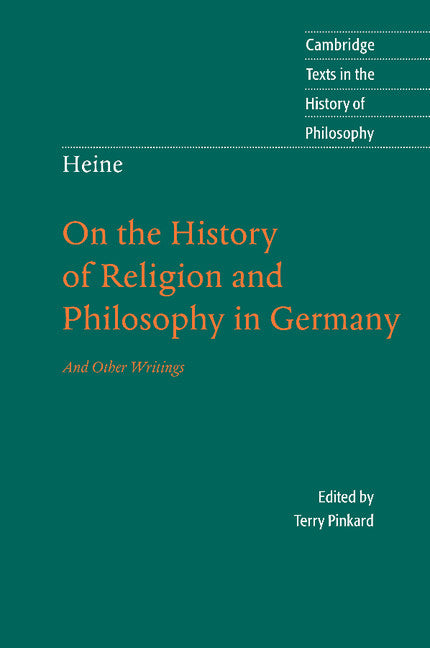
3:16: So the reformation in Germany was the battle of spiritualism against materialism?
HH: Yes. The indulgence sellers were chased away, the priest’s lovely concubines were replaced by cold wives, the charming images of the Madonna were smashed, and here and there a Puritanism emerged with utmost hostility towards the senses.
3:16: And this is very different from the way the French attacked the church?
HH: In France one fought with lewd wit; instead of having theological disputations one here wrote amusing satires.The most malicious blossom of such comical polemic is indisputably Tartuffe by Moliere for this work is aimed not only against the Jesuitism of his time but also against Christianity itself, indeed, against the idea of Christianity, against spiritualism.
3:16: But in Germany spiritualism with Luther won?
HH: As soon as spiritualism made a breach in the old church building, sensualism burst out with all of its long-contained fire, and Germany became the wildest playground in the rush for freedom and sensuality.Everywhere, monastery and convent gates opened, and nuns and monks hurled themselves smooching into each others’ arms. On the surface , the history of that time consists almost entirely of outbreaks of sensuality. But little of this persisted as spiritualism put down the trouble-makers and gradually consolidated its rule on the north until spiritualism itself was wounded to death by an enemy which it had nourished in its own bosom – namely, philosophy.
3:16: Before we come to that, you see Luther as a great man don’t you?
HH: Luther is not only the greatest but also the most German man of our history. In his character, all the virtue and faults of the Germans are unified in the most magnificent way, and he represents in person the wonder of Germany. He was at the same time a dreamy mystic and a practical man of deeds. His thoughts not only had wings but also his hands; he spoke and he acted. He was not only the tongue but also the sword of his time. He was also both a cold scholastic quibbler and an inspired, divinely euphoric prophet. He was a complete person, I would even say, an absolute person in whom spirit and matter are undivided.
3:16: You find much to admire in Protestantism don’t you?
HH: If, because of Protestantism, we in Germany lost much poetry in addition to the old miracles we have still gained much in return. It had the most beneficial influence on morality, purity of manners, and rigor in the practice of duties. Among the Protestant clergy we often find the most virtuous people whom even the ancient Stoics would have respected. Luther granted human reason the right to explain the Bible and Reason was thus acknowledged as the highest judge in all religious controversies.
3:16: And is this the start of philosophical reasoning becoming a powerful movement that would eventually corrode religion?
HH: The princes who legitimated the Reformation legitimized this freedom of thought and one important fruit of it – important for the world – is German philosophy.
3:16: So with Protestantism came freedom of thought?
HH: Yes. In fact, not even in Greece was the human spirit able to express itself as freely as in Germany from the middle of the eighteenth century until the French invasion.
3:16: With Napoleon in 1806 you mean?
HH: Yes.
3:16: Things have changed though?
HH: Yes. Censorship and freedom of the press is now fiercely discussed and its solution is not difficult if you consider that freedom of the press is nothing but the consequence of the freedom of thought, and hence a Protestant right. The same can be said for the question of academic freedom.
3:16: Luther is important in all this too isn’t he?
HH: Martin Luther gave us not only the freedom of movement, but also the means of movement; that is, he gave the spirit a body, the thought, the word. He created the German language.
3:16: How?
HH: By means of his Bible translation. As for the language into which he translated his Bible – I am still unable to comprehend how Luther arrived at it. But I do know because of this Bible Luther’s language was spread in a few years over all of Germany and became the universal written language. And since this book is in the hands of the poorest people they do not need any particular academic instruction to express themselves in a literary manner. Freedom will be able to be spoken everywhere and its language will be biblical.
3:16: This impacted on poetry as well didn’t it?
HH: In German literature before Luther we find Germanic nationality and the Indian-Gnostic, so-called Catholic Christianity. The spirit of treatment in this older literature is romanticThe general character of that literature was that the same firm and secure belief which at the time ruled in all secular and sacred things was proclaimed in all of its products.The poet walked with the certainty of a mule beside the abysses of doubt, and in his works a bold calm and a blessed confidence prevailed. The poems of the Middle Ages thus have all the same character; it is as if the whole nation wrote each, not a single person. They are objective, epic and naïve.
3:16: And post-Luther?
HH: Its content is the struggle of the views and interests of the Reformation with the old order of things. Germanic nationalism and Indian-Gnosticism is completely repugnant to the spirit of the new times in whose place the true religion of the Jewish-Deistic gospel should enter. The spirit makes inventions which promote the well-being of matter. Spiritualism becomes discredited in public opinion because of thriving industry as well as philosophy. The third estate rises; revolution begins to rumble in the hearts and heads. The spirit of treatment is no longer romantic but classical, they sought to acquire for themselves the spirit of ancient antiquity or at least to imitate classical art forms in their writings. The general character of modern literature consists of the fact that now individuality and skepticism predominate. Poetry is no longer objective, epic and naïve but subjective, lyric and reflective.
3:16: Kant is the figure you say started the German philosophical revolution but you locate precursors who were important to this don’t you?
HH: The philosophical revolution which emerged from the religious one is nothing other than the logical conclusion of Protestantism. So Richard, not Bacon, as one often hears, but Rene Descartes is the father of modern philosophy.
3:16: He’s French not German though.
HH: The noisy, turbulent, chattering French never provided a suitable soil for philosophy; perhaps philosophy will never flourish there. Rene Descartes felt this and went to Holland. Only there could he have caught sight of thought itself lurking there at the very base of self-consciousness and was even able to validate self-consciousness by means of it in his world-fanous thesis: “Cogito ergo sum.”
3:16: What makes him the first modern philosopher?
HH: He deserves credit for having established the autonomy of philosophy. Philosophy no longer had to beg theology for permission to think.
3:16: Didn’t the Scholastics do that?
HH: The Scholastics were a secret philosophical opposition to the Church. But publicly they feigned the greatest obsequiousness and even fought in some cases for the church. This comedy lasted for more than six centuries. By destroying scholasticism Descartes also destroyed the outdated opposition of the Middle Ages. The new times demanded new brooms.It was less the catholic Church than the rearguard of the scholastics who rose up against Cartesian philosophy. The pope didn’t ban it until 1663.
3:16: Now you see Descartes as adding to the spiritual/materialism divide another divide concerning epistemology?
HH: From the oldest times there have been two opposing views about the nature of human thought. The one view claims our minds to be a tabula rasa upon which experience later writes something new every day according to fixed rules of writing. This view has been called sensualism or empiricism. Those holding the opposite view claim that ideas are innate to human beings and the external world , experience and the mediatory senses lead us only to knowledge of what was already in our mind beforehand; they only awaken the ideas which sleep there. This was called spiritualism, sometimes rationalism.
3:16: Ok, that’s confusing. That’s not what you mean by spiritualism and sensualism earlier is it?
HH: No. Spiritualism and sensualism are the two social systems which can be seen in all of life’s manifestations. Spiritualism seeks to denounce matter; sensualism aims at a rehabilitation of matter. As to the philosophical opinions about the nature of our knowledge I prefer to use the names idealism and materialism; the first to designate the doctrine of innate ideas, ideas a priori, and the second to designate the doctrine of intellectual knowledge by means of experience and the senses, ideas a posteriori.
3:16: Descartes’ spiritualism never took off in France according to you?
HH: French sensualists were normally materialists. The French philosophers chose John Locke as their master. The Essay on Human Nature became their gospel, they swore by it. John Locke was schooled on Descartes and learned everything that an Englishman could from him: mechanics, the art of analysis, combination, construction, calculation. There was one thing he was unable to grasp: innate ideas. He made the human mind into a kind of calculating machine, the whole human being into an English machine. The students of Locke are all afraid of the final consequences of their first principle- the follower of Condillac is terrified of being put in the same class as Helvetius or even worse Holbach or, worse of all, La Mettrie. And yet it has to be done and I lump all of French philosophers of the eighteenth century together as materialists. L’Homme machine is the most ruthlessly consistent book of French philosophy, and the title is already the last word on its entire view of the word. These materialists were also supporters of deism most of the time since a machine presupposes a mechanic.
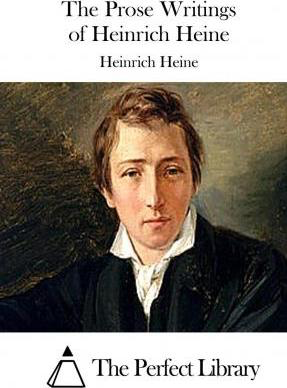
3:16: You see materialism as spreading to England too don’t you?
HH: The revolutionary parties the Benthamites , the preachers of utility, base themselves on Locke. John Bull is a born materialist and his Christian spiritualism is mostly traditional hypocrisy. 3:16: But Germany philosophy is different isn’t it? HH: Germany has always expressed aversion towards materialism and has become the true home of idealism during the last century and a half. 3:16: And yet they also followed Descartes into modernity? HH: Yes, the Germans were students of Descartes and the greatest of these students was Gottfried Wilhelm Leibniz. Just as Locke follows the materialist direction, Leibniz followed the idealist direction. He fought Locke in his ‘New Essays Concerning Human Understanding.’
3:16: Some think Leibniz not really a modern philosopher because he defended the Trinity, eternal damnation and the divinity of Christ.
HH: He very easily defended the whole of Christianity, meaning that he defended it against half-measures of his opponents. Afterwards he stood on that point of indifference.This point of indifference was later recognized by Mr Schelling and given a rigorous foundation by Hegel, as a system of systems. In the same way Leibniz worked to harmonize Plato with Aristotle. More recently this task has been attempted among us.
3:16: Have you succeeded?
HH: No, truly no. Because this task is no different from that of finding a settlement of the conflict between idealism and materialism. Plato is an idealist through and through. In Aristotle, on the other hand, knowledge is taken from experience, not revealed in relation to what came before in this world. Plato and Aristotle! These names represent not only two systems, but also models of two different human types which since time immemorial have been in more or less openly hostile conflict with each other, whatever the costume.
3:16: You’ve shown how Locke and Leibniz were important students of Descartes, but there’s another figure you regard as very important in this transition into modern philosophy, and that’s Spinoza.
HH: The philosophy of Descartes by no means produced that of Spinoza but only advanced it. The philosophy of Spinoza, the third son of Rene Descartes, is just as distant from the materialism of his brother Locke as from the idealism of his brother Leibniz. He gives us his great synthesis, his explanation of the divinity. There is only one substance: this is God. All finite substances derive from it, are contained in it, appear in it, and disappear in it; they have only a relative passing accidental existence. Infinite thought and infinite extension are the two attributes of the absolute substance; however God, the absolute substance has perhaps still others of which we do not know.
3:16: You think a lot of German philosophy is a refinement of this don’t you?
HH: An attribute of God is just a different form of our intuition and these different forms of intuition are identical in the absolute substance. Thought is invisible extension and extension visible thought. We have arrived at the main theorem of German Identity Philosophy which, in essence, is not at all that different from the doctrine of Spinoza.
3:16: So you’re saying that Spinoza and Schelling arrived at the same place but got there differently?
HH: Spinoza merely took a different route to the same philosophy yes.
3:16: We’re talking here about what the Germans call ‘Naturphilosophie’ yes?
HH: Yes.The later naturphilosophie has only the merit of demonstrating the eternal parallelism between spirit and matter in a most astute manner. I say spirit and matter as synonyms for what Spinoza calls thought and extension.
3:16: God is a key to all this isn’t it? Is German philosophy all about unifying these two things, and whatever it ends up with, however it’s done, it’s called God? So Deists, Pantheists, and Idealists are all after the same thing?
HH: The God of the pantheists is different from the God of the deists in that the former is the world itself whereas the latter is entirely outside it, or above it. The God of the deists can only be differentiated by the sort of rule they envisage: the Hebrews see God as a thundering tyrant, Christians as a loving father, Rousseau’s students as a wise artist who produced the world in about the same way as their papa made watches and as connoisseurs of art they admire the work and praise the master above. Only the spirit is holy. They become the people of the spirit, chaste, modest, serious, abstract, stubborn, suited to martyrdom, and their most sublime blossom is Jesus Christ. Te Jews regarded the body with contempt and Christians as bad, as evil itself.
3:16: You see it as an impossible religion to fulfil on earth.
HH: This religion was too sublime, all too pure, all too good for this same earth, it was only possible to proclaim the idea in theory but never put it into practice. Christianity left , the worldly, in the hands of Caesar and his Jews but lo and behold, in the end , the sword they hated and the money they despised achieved ultimate power.
3:16: So philosophy is a way of trying to get world, matter and the body away from the Christian asceticism and give it a positive spin?
HH: Yes. Purusa must be remarried to Prakriti.
3:16: So that’s Hindu mythology isn’t it, spirit and matter?
HH: Yes. Their violent separation, so profoundly conveyed in the Indian myth, caused the great rending of the world, evil. Matter only becomes evil when it is forced to conspire in secret against the usurpations of spirit. Evil is thus itself a result of the spiritual world order.
3:16: So this is where pantheism comes in?
HH: God is identical with the world. He manifests himself in plants which lead cosmic magnetic lives devoid of consciousness, in animals which in their sensuous dream-lives have vague feelings of existence and most magnificently he manifests himself in human beings. In the human being divinity comes to self-consciousness, and such self consciousness again itself reveals the divine by means of the human being. One can justly say of humanity in its entirety it is an incarnation of God.
3:16: So materialism is often thought of as being atheistical or at least indifferent to ideas about God but you don’t think this do you?
HH: The political revolution based on the principles of French materialism will find no opponents among the pantheists but allies – allies whose convictions are taken from a deeper source , from a religious synthesis. The great motto of the Revolution expressed by Saint-Just : ‘Bread is the right of the people’ reads for us: ‘Bread is the divine right of the human being.’
3:16: So you want to take the revolution to a different level?
HH: We want to be neither the sans-culotte, nor frugal citizens, nor parsimonious presidents; we will found a democracy of gods, equally glorious, equally holy, equally joyous.
3:16: But we aren’t gods really are we? Why not stick to being, you know, just human?
HH: You demand simple clothes, abstemious morals and spiceless enjoyments; we, on the other hand, demand nectar and ambrosia, kingly robes, costly fragrances, sensuality and splendor, the dances of laughing nymphs, music and comedies…
3:16: Ok, I’ll go with that kind of god. So this is what lies inside or behind german philosophy?
HH: Pantheism is the clandestine religion of Germany.
3:16: So how is this important to the development of German philosophy. You were talking about the importance of Leibniz.
HH: Christian Wolff not only systematized the ideas of Leibniz but presented them in German.
3:16: Because Leibniz wrote in latin?
HH: Yes. As was the case for Luther in theology, until Wolff we only knew how to discuss philosophy in Latin. Latin can never deny its origins. It is a language of command for generals, a language of decrees for administrators, a language of law for userers, a lapidary language for rock-hard Romans, the proper language for materialists. Having said that, if the Romans had been obliged to learn Latin, they would never have found the time to conquer the world.
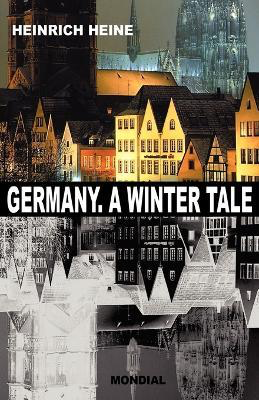
3:16: So with German language new things could be expressed and thought?
HH: In no language besides our German mother tongue could nature have revealed its most secret workings. Only on the strong oak could the holy mistletoe flourish.
3:16: Paracelsus wrote in German didn’t he?
HH: He was a great charlatan and claimed to be able to make mini people but he was at the same time one of the most profound investigators of nature. Jakob Bohme also used the german language in his philosophical accounts. But I have never been able to read him. I suspect those who praise this mystic intend to mystify the public. Jakob Bohme too used the German language for philosophical treatises, and has gained high praise in this regard. But I have never yet been able to sit down and read him. I do not like to be made a fool of... Charles I was so impressed by this theosophical cobbler that he sent a scholar specially to Gorlitz to study him. This scholar was more fortunate than his royal master. For while the latter lost his head at Whitehall by Cromwell's axe, at Gorlitz the former, thanks to Jakob Bohme's theosophy, only lost his wits.
3:16: Wolff was to philosophy what Luther was to theology?
HH: Yes. The trouble was that Christian Wolff could only master one portion of and built them into a woeful tabernacle of deism. Wolff had more an encyclopedic mind than a systematic one and he understood the unity of a doctrine to mean its completeness. Of course he, as a grandchild of Descartes inherited his grandfather’s form of mathematical proof which led to the greatest harm, an unbearable schematism, and the so-called Wolffian dogmatism.
3:16: Despite this it was hugely influential wasn’t it?
HH: It finally flooded all of Germany. His spiritual dominance over Germany lasted more than half a century.
3:16: It was Wolffianism that you say shows how philosophy and religion can’t mix wasn’t it?
HH: As soon as religion looks to philosophy for help its downfall is inevitable. Religion, like any absolutism, must not try to justify itself. Prometheus is chained to the rock by silent force. Certainly, one cannot deny that religious absolutism, like the political kind, has found powerful argans for its word. But let us not despair. If the word lives, it can be carried by dwarfs; if it is dead, not even giants can uphold it. The rationalist direction of protestant theology’s most powerful support came from Berlin, where Frederick the Great – materialism with a crown - and the bookseller Nicolai reigned. Frederick the Great won the battle at Rossbach, took a lot of snuff and believed only in cannons. He insulted the German spirit, he wounded the German national feeling. The contempt in which he held our literature still irritates us generations later. The bookseller Nicolai supported us and tried to do in Germany what the Encyclopedists did in France, he sought to eliminate the influence of the past over the spirit of the people. But he was not up to the undertaking. He took real giants to be windmills, for example, a certain Wolfgang Goethe.
3:16: He agreed with Lessing though that Goethe’s Werther was too sentimental and that the ending would inspire melodrama and sterile sentimentality didn’t he? He was right about that wasn’t he?
HH: He actually published an altered version of Werther: the hero did not shoot himself but only covered himself with chicken blood which was in the pistol rather than lead. Werther makes a fool of himself, remains alive, marries Charlotte, in short, has a more tragic ending than in Goethe’s original ending.
3:16: Mendelssohn is another figure you admire?
HH: The German Socrates. As Luther overthrew the papacy, so Mendelssohn overthrew the Talmud by rejecting tradition declaring the Bible to be the source of religion and translating its most important part. The Talmud is the Catholicism of the Jews. It is a Gothic cathedral. He nevertheless sought to preserve the Mosaic ceremonial law as a religious duty. Was it cowardice or cleverness? He saw in pure Mosaism an institution which could serve as a line of defence for deism, his most inner faith and his deepest conviction. When his friend Lessing died and was accused of Spinozaism he defended him with the most fearful zeal and his anger at this controversy led to his own death.
3:16: Lessing’s an important figure too isn’t he?
HH: Since Luther, Germany has not produced a greater or better man than Gotthold Ephraim Lessing.
3:16: What did he do?
HH: He was the living voice of criticism at the time. His whole life was polemical. He killed with arrows of wit. His wit was no small French greyhound running after its own shadow. His wit was more like a large German tom-cat who plays with a mouse before killing it. Buffon’s wonderful saying: ‘The style is the man’ applies to no one better than Lessing. Lessing continued the work of Luther, was the one who contributed most to our liberation from the tyranny of the letter. The letter is the last veil of Christianity and only after the veil falls will the spirit emerge. This spirit is no different from what the Wolffian philosophers thought they were demonstrating, what the philanthropists felt in their souls, what Mendelssohn found in Mosaism, what the freemasons sang and the poets whistled, what made itself heard at that time in Germany in every form: pure deism.
3:16: He died as the Critique of Pure Reason was being published in Koningsberg didn’t he?
HH: With this book a spiritual revolution begins in Germany which has the oddest analogies with the material revolution in France and to which the serious thinker must assign equal importance. It went through the same phases and there is the most remarkable parallelism between the two.
3:16: In what way?
HH: On both sides of the Rhine we see the same break with the past; all reverence for tradition is annulled. As with every law in France in Germany every thought must be ustified, and as in France the monarchy there in Germany deism is overthrown, the keystone of the ancien regime. Did you hear the bell ringing? Kneel down – sacraments are being brought for a dying a god.
3:16: Very Nietzschean Heinrich! So, Kant. Why is he so important?
HH: It is said that night spirits become alarmed at the sight of an executioner’s sword – How terrified they must have been when Kant’s Critique of Pure Reason was out in front of them. The book is the sword by which deism was executed in Germany. Kant far surpassed Robespierre (the bloody hand of Rousseau) in terrorism. In both we find the same unrelenting, cutting, unpoetic and sober honesty. In both the same aptitude for distrust – Kant calls it criticism, Robespierre Republican virtue. Both demonstrate to the highest degree the type of the petit-bourgeois – nature had meant them to measure out sugar and coffee but fate forced them to weigh other things.
3:16: That’s one of the things about Kant isn’t it – his life was very bourgeois but his thought was revolutionary wasn’t it?
HH: The history of Immanuel Kant's life is difficult to portray, for he had neither life nor history. He led a mechanical, regular, almost abstract bachelor existence in a little retired street of Königsberg, an old town on the north-eastern frontier of Germany. I do not believe that the great clock of the cathedral performed in a more passionless and methodical manner its daily routine than did its townsman, Immanuel Kant. Rising in the morning, coffee-drinking, writing, reading lectures, dining, walking, everything had its appointed time, and the neighbors knew that it was exactly half-past three o'clock when Kant stepped forth from his house in his grey, tight-fitting coat, with his Spanish cane in his hand, and betook himself to the little linden avenue called after him to this day the "Philosopher's Walk." Summer and winter he walked up and down it eight times, and when the weather was dull or heavy clouds prognosticated rain, the townspeople beheld his servant, the old Lampe, trudging anxiously behind Kant with a big umbrella under his arm, like an image of Providence. What a strange contrast did this man's outward life present to his destructive, world-annihilating thoughts! In sooth, had the citizens of Königsberg had the least presentiment of the full significance of his ideas, they would have felt far more awful dread at the presence of this man than at the sight of an executioner, who can but kill the body. But the worthy folk saw in him nothing more than a Professor of Philosophy, and as he passed at his customary hour, they greeted him in a friendly manner and set their watches by him.
3:16: So what is it in Kant’s philosophy that destroyed deism?
HH: Philosophers before Kant have thought about the origin of knowledge and have gone down two different paths – the a priori or the a posteriori. There has been less thought about our faculty of knowledge and its extent and boundaries. This now became Kant’s task. He found out that we can know nothing about a great number of things which we earlier thought to know most intimately. This was most irksome.
3:16: What things can’t we know about according to Kant then?
HH: Kant proved to us that we know nothing of things as they are in and for themselves. We know them only to the extent that they are reflected in our mind. We are just like the prisoners in the 7th book of Plato’s Republic.
3:16: In the cave?
HH: Quite. They see only the shadows of the statues the people are carrying. They take those shadows to be real things. Philosophy before the appearance of Kant had run around sniffing at things, collecting and classifying features of them. With Kant this ended and he led research back into the human mind and investigated what was there. He compared his philosophy to the method of Copernicus. Earlier reason, like the sun, orbited around the world of appearances and sought to illuminate it. Kant, however, let reason, the sun, stand still, and he let the world of appearance orbit around it and become illuminated whenever it entered into the realm of the sun.
3:16: So he distinguishes between appearances and things in themselves. We can never know the things in themselves. This is the crucial move is it?
HH: The centre of his philosophy is the part where he treats so-called phenomena and noumena. Since we can only know something about things insofar as they reveal themselves to us through appearance and since therefore things do not show themselves to us as they are in and for themselves we can only know something about things as phenomena , we can know nothing about them as noumena. The latter are only problematic: we cannot say ‘they exist’ nor ‘they do not exist’ . Indeed the word noumena is contrasted with the word phenomena only in order to be able to speak of things inasmuch as they are knowable to us, without our judgment touching on things which are not knowable. Thus Kant did not divide things into phenomena and noumena into things which exist for us and things which do not exist for us. This would be a philosophical Irish bull. He only wanted to give us a limit-concept.
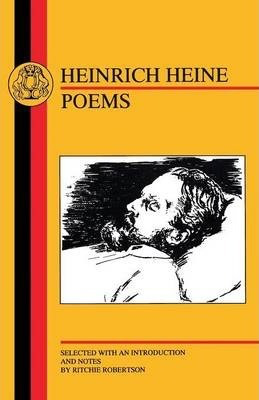
3:16: Ok, so how did this spell the end for Deism?
HH: God is, for Kant, a noumenon. The transcendental ideal being which we have until now called God is a fiction. All of the other cloud castles of the deists are destroyed. I must add that Kant, in attacking the three main types of argument for God’s existence, namely the ontological, the cosmological and the physio-theological , in my opinion destroys the latter two but not the first. Discussion of the existence of God is deplorable however all the more praiseworthy is contemplation of the nature of God. The soul is taken away from the finite and the transitory and arrives at the consciousness of original goodness and eternal harmony.
3:16: So deism faded as speculative reason took hold in German philosophy?
HH: Well, after the tragedy comes the farce. Up til now Kant as the relentless philosopher has played the tragic hero; he has stormed heaven , he has disposed of the whole crew, the ruler of the world swims, unprovable, in his own blood, there is now no more mercy, no fatherly benevolence, no reward in the hereafter for abstinence now, and immortality of the soul lies in its final agonies – and old Lampe stands there with his umbrella under his arm watching in dismay, his face dripping with anxious sweat and tears. Seeing this Kant takes pity and shows that he is not merely a great philosopher but also a good person. He thinks, with half goodwill and half irony Kant distinguishes between theoretical and practical reason and with the latter, as with a magic wand , he again animates the corpse of deism which he had killed by theoretical reason.
3:16: Is that what he actually did, for those motivations?
HH: Did Kant stage the resurrection not just for old Lampe but for the police? Or did he really act out of conviction? Was his true intent to show us the difficulty of not being able to know anything about the existence of God? Maybe.
3:16: The Critique wasn’t a big sensation when it came out was it?
HH: No. But by 1789 nothing was more talked about than Kant’s philosophy.
3:16: You don’t think this was just about the content of what he wrote do you?
HH: He did not produce this great intellectual movement by means of the content of his writings , but rather through the critical spirit which reigned in them, and which now penetrated all the sciences. All the disciplines were seized by it. Even poetry was not spared its influence. Schiller, for instance, was a powerful Kantian and his views of art are heavy with the spirit of Kantian philosophy.This Kantian philosophy with its abstract dryness was quite damaging to literature and the fine arts. Fortunately it did not influence the culinary arts.
3:16: And this wasn’t just an academic movement was it?
HH: Germany was placed upon a philosophical course by Kant and philosophy became a matter of national importance.
3:16: And you take Fichte to be a standout figure in the crowd of thinkers that followed Kant?
HH: Among the students of Kant Johann Gottlieb Fichte stood out early on. I almost despair of giving a true idea of the importance of this man. In the case of Kant we needed consider only one book but here in addition to the book we must take account a man.
3:16: He’s difficult to follow isn’t he?
HH: We encounter unique difficulties of content and form and method.
3:16: Ok, so what’s the issue with his method?
HH: It is completely borrowed from Kant. But soon this method changes because of the nature of its object. Kant has only critique, something negative. Fichte however was later to create a system, thus something positive. He sets up a system, he constructs zealously, even idiosyncratically and when he has constructed the entire world he begins just as jealously and idiosyncratically to demonstrate his construction from top to bottom. In this he reveals an abstract passion. Just as it dominates the system itself subjectivity soon also controls its manner of presentation.
3:16: Kant doesn’t does he?
HH: No, Kant lays his thought in front of him, dissects it, and cuts it into its finest fibres. His Critique of Pure Reason is the anatomical theatre of the spirit. He himself remains cold, devoid of feeling, like a true surgeon.
3:16: And what about the form of Fichte’s writings?
HH: It is lively but it has all the mistakes of life, it is restless and tangled. Fichte spurns the conventional terminology of philosophers which seems to him something dead. But this makes it even harder for us to arrive at an understanding of it. In general Fichte has many strange ideas about understanding.
3:16: So what do you think the content is?
HH: Its content in and of itself has no great importance. It has no social consequences. It documents the fruitlessness of idealism taken to its logical conclusion and it provides the necessary transition to today’s Naturphilosophie.
3:16: But he must have said something?
HH: Ok, the problem Fichte sets for himself is this: what grounds do we have to assume that our impressions of objects also correspond to things outside of us? And the solution he gives: all things have reality only in our mind. His ‘Doctrine of Science or Theory of Knowledge', the Wissenschaftslehre, refers the mind back to itself. But where Kant analyses, Fiche constructs. It begins with an abstract formula - I+I – and creates the world from the depths of the mind. It fits together against the pieces which had been taken apart and traces back wars the path of abstraction until it reaches the world of appearance. This world of appearance can then be explained by the mind as a series of necessary actions of intelligence.
3:16: Kind of Berkeley meets Carnap.
HH: Huh?
3:16: Never mind.
HH: In Fichte there is also the particular difficulty that he expects the mind to observe itself while it is active.The I is supposed to make observations about its intellectual acts while it carries them out. Thought is supposed to eavesdrop on itself as it thinks, as it slowly becomes warm and warmer and is finally cooked through.
3:16: Ah, this is where the joke about the Fichtean goose comes in yes?
HH: It had such a large liver that it no longer knew whether it was a goose or the liver. On its abdomen were the words I = I.
3:16: So this is a very extreme idealism?
HH: It appeared to the public as a joke which had been carried too far.
3:16: You think the jokes were based on a misunderstanding?
HH: The Fichtean I is not an individual but rather the general World-I come to consciousness. Fichtean thinking is not the thinking of an individual, a particular person, who is called Johann Gottlieb Fichte, it is rather a general thinking which manifests itself in one individual. Just as one says it’s raining, it’s lightening etc so Fichte should not say ‘I think’ but rather ‘it thinks’, ‘the universal world-thinking thinks in me.’
3:16: It’s pretty extreme though isn’t it? Is this why you compare him to Napoleon?
HH: Napoleon and Fichte represent the grand unrelenting I for whom thought and deed are one and the colossal structures both were able to construct testify to a colossal will. But both structures were soon to go to ruin because of the limitlessness of this will.
3:16: You admire their extremism?
HH: I agreed entirely with Fichte's uncompromising, stubborn, iron character. How atrocious he must have seemed to the unprincipled skeptics, the frivolous eclectics and the moderates of every colour. Poverty sits by their cradle and rocks them to greatness and this gaunt nanny remains their life-long companion.
3:16: Fichte ended up in Jena in 1794 didn’t he?
HH: Well he got charges of atheism brought against him there, bringing him insufferable persecution and causing his departure from Jena in 1789.
3:16: And weren’t Herder and Goethe involved in this?
HH: Yes but both can be reasonably excused. Goethe only criticised Fichte for saying what he thought. It was an open secret that since Kant deism had been annihilated in the world of German thought but a secret one was not supposed to shout out loud in the marketplace. Goethe was as little a deist as Fichte, he was a pantheist. It was precisely from the height of pantheism that Goethe could best see the untenability of Fichtean philosophy and his mild lips had to smile. To Jews, which is what all deists are in the final analysis, Fichte must have been a horror; to the heathen, he was just a fool. Take into account Goethe’s position. This giant was a minister in a german dwarf state. He could never make natural movements.
3:16: Couldn’t he have helped a bit?
HH: Should he have risked all for a teaching that was not merely wrong, but also ridiculous? The German Jupiter remained calmly seated and let himself be calmly worshipped and perfumed with incense. The only thing that speaks in favour of Fichte is that the accusations were a pretext and political. Look Richard, Fichtean idealism is among the most colossal errors ever concocted by the human spirit. It is more godless and damned than the crudest materialism. Mind you Richard, he said , quite correctly, that, to a philosopher, the question whether a philosophy is atheistic or not sounds as strange as the question whether a triangle is red or green does to a mathematician.
3:16: By the way, I thought Goethe was called the great heathen?
HH: Goethe’s heathenism is wonderfully modern. His strong heathen nature shows itself in his clear grasp of all external appearances, of all colours and shapes, but Christianity at the same time endowed him with a deep understanding, initiated him into the mysteries of the spiritual world, understood the hidden voices of nature. That heathen nature was permeated with the sentimentality characteristic of today, the unique marble pulsed in such a modern manner. He experienced just as intensely the sufferings of a young Werther as the joys of an old Greek god. Goethe’s pantheism is thus very different from that of the heathen. Goethe was the Spinoza of poetry.
3:16: And it’s out of this Spinoza infused pantheism that Romanticism starts to rear its head isn’t it?
HH: Indeed, our first Romantics acted from a pantheistic instinct which they themselves didn’t understand. The feeling they took for homesickness for the Catholic Mother Church had a deeper origin that they were aware of – it was a yearning to go back to old Germanic pantheism.
3:16: Ok, so what is German Romanticism?
HH: It was nothing but the reawakening of the poetic spirit of the Middle Ages as manifested in songs, artistic works, architecture, art and life. It emerged out of Roman Catholicism, that religion whose first dogmas include the damnation of the flesh, grants the superiority of the spirit over flesh but also seeks to mortify the flesh in order to glorify the spirit, that religion which became the most reliable support of despotism by preaching the reprehensible nature of earthly goods and by enjoining dog-like humility and angelic patience. People are no longer happy being nourished on references to heaven. It may well be that the Christian-Catholic worldview has reached its endpoint. On the other hand we no means deny the benefits that came with it. It was an essential salutary reaction to the horribly colossal materialism which had developed in the Roman Empire and which threatened to annihilate the spiritual splendor of humanity. The flesh had become too impudent . Spiritualism worked in a salutary way on the overly healthy peoples of the north. The all too full blooded barbarian bodies became spiritual, as Christians. European civilization began. The art of the Middle Ages show this overcoming of matter through spirit.
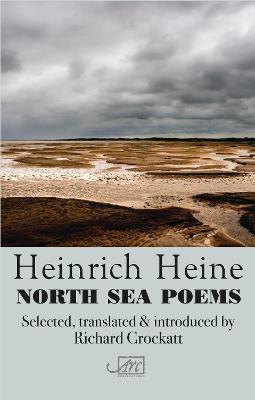
3:16: Is it this overcoming of the too impudent fleshiness what makes medieval art different from the Greek and Roman classical art?
HH: With regard to this difference, we call the first Romantic and the second Classical poetry. These designations are unreliable labels and have resulted in unhelpful confusions. Plastic form should be the main point in romantic modern art just as in antique art.
3:16: So what makes them different?
HH: The difference is the following: in antique art, the plastic forms are entirely identical with what is to be represented, with the idea that the artist wants to represent. It is different with Romantic art; there the wanderings of a knight have in addition an esoteric meaning, they refer perhaps to the wanderings of life in general; the dragon who is conquered is Sin; the almond-tree which sends its aroma so comfortably to the hero from afar is the Trinity who together at the same time are one, as nut, fibre and seed are the same almond.
3:16: So the Romantic art is aiming at the spiritual throughout?
HH: Yes. Classical art had only to represent the finite, and its forms could be identical with the idea of the artist. Romantic art has to represent or rather refer to the infinite and purely spiritual relationships and it took refuge in a system of traditional systems, or rather, in the parabolic. 3:16: So the imagination becomes much more obviously at work in the romantic art? HH: Thus the mystical, mysterious, fantastic and excessive in the art works of the Middle Ages. Imagination makes horrifying efforts to represent the purely spiritual through sensuous images and it invents the most colossal products of madness; it piles Pelion on Ossa, the Parsifal on the Tinturel in order to reach its heaven.
3:16: So when Catholicism died did Romanticism in Germany?
HH: The arts are only the mirror of life, and as Catholicism died out in life, so it faded and paled in art as well.
3:16: So was neo-classicism the artistic side of Protestantism?
HH: In art, as in life, Protestantism was astir. Leo X, the magnificent Medici, was as zealous a Protestant as Luther. The rosy flesh in Titian’s paintings, it is all Protestantism. The loins of venus are much more radical theses than those which the german monk attached to the doors of Wittenberg.
3:16: Lessing was part of this move in Germany wasn’t he?
HH: Lessing was the literary Arminius who freed our theatre from foreign rule. He powerfully destroyed the epigones of French pseudo-Classicism.
3:16: Didn’t the Romantic movement respond again at the neo-Classical?
HH: Well, the school we call Romantic arose against Wieland, Iffland and Kotzebue in the last years of the eighteenth century. The self appointed directors of the school were August Wilhelm and Friedrich Schlegel. Jena was the centre from which the new aesthetic spread. One often hears of the influence of Fichtean idealism and Schelling’s Naturphilosophie on the romantic school. I see at most the influence of a few fragments, not at all the influence of a philosophy. Be that as it may, Schelling exerted a great personal influence on the romantic school.
3:16: What did the Schlegel’s do?
HH: they praised the best works of the past as paradigms – primarily works of Catholic art of the Middle Ages. Shakespeare stands on the border of this type of art, smiling already with Protestant clearness into our modern times, was translated only for polemical purposes. Calderon placed above Shakespeare! Zacharias Werner took this as far as one could without being locked up in a madhouse! The German madness was pursued with unrivalled pedantry. The political condition was especially favourable for a Catholic: ‘misery teaches us to pray.’
3:16: And when the romantic school failed, this is where we find Goethe?
HH: The romantic school was destroyed in the realm of public opinion through the disclosure of Catholic intrigues at the same time it received a devastating protest within its own temple from the mouth of one of those very gods that it had itself set up there. None other than Wolfang Goethe stepped off his pedestal and spoke the verdict of damnation over the Schlegel’s, over the same high priests who had perfumed him with so much incense. This voice destroyed the entire apparition; the ghosts of the Middle Ages fled, the owls crept away back into obscure castle ruins. Friedrich Schlegel went to Vienna where he attended daily mass and ate roast chicken: August Wilhelm Schlegel retired to the pagoda of Brahma.
3:16: Schiller thought Goethe a bit unfair on the Schlegel’s didn’t he?
HH: Not really. He was annoyed by their impertinent attraction to scandal and calls them whippersnappers.
3:16: The two poets were seen as holding rival approaches to art weren’t they?
HH: The Goetheans view art as an independent second world which they place above the world of variable and ever-changing human activity, their religion and morality, which goes on below. They allow themselves to be misled to proclaim art itself as the highest value and to turn away from the demands of that first actual world. Schiller was much more attached to this first world than Goethe. Schiller plunges himself entirely into history, waxes enthusiastic for the social progress of humanity and sings the story of world history. Goethe sinks more and more into individual feeling or into art or nature. For Goethe the pantheist the study of nature had to be a central occupation. His indifferentism was a result of his pantheistic view of the world.
3:16: You think indifferentientism doesn’t necessarily follow from pantheism do you though?
HH: Not everything is God, but God is everything. God does not manifest himself in equal degrees in all things. This is the great law of progress in nature. It leads not to indifferentism but rather to the most self-sacrificing desire for progress. Goethe irritatedly rejected Christian enthusiasm and did not understand or want to understand the philosophical enthusiasm of our time for fear of having his spiritual peace interrupted. He became the greatest artist in our literature and everything that he wrote became a well-rounded work of art. But they are statues. Goethe’s literary works do not beget deeds in the way Schiller’s do. But nothing is more foolish than to disparage Goethe in favour of Schiller.Goethe’s greatest merit lies in the perfect completion of everything he portrays. In Homer, in Shakespeare, in the works of all the great poets there are actually no secondary characters at all, each figure is the main character when it appears. To such an artistic despotism we owe the marvellous perfection of the smallest figures in the works of Homer, Shakespeare and Goethe.
3:16: And you take his Faust to be really a quintessence of the themes of spiritualism philosophers and theologians in Germany have been wrestling with in modernity?
HH: The Germans have sensed for a long time that the German people is itself the learned Dr Faustus, is itself that spiritualist who finally understands with his spirit the insufficiency of the spirit, demands material enjoyments, and reinstates the rights of the flesh – but still caught up in the symbolism of catholic poetry, where God is the representative of the spirit and the devil the representative of the flesh, one called that rehabilitation of the flesh an apostasy from God, a pact with the devil.
3:16: But the new phase following from Fichte was this naturphilosophie you keep mentioning. So what is this?
HH: Joseph Schelling turned the matter round. Fichte wanted to construct the real intellectually from the ideal. Joseph Schelling wanted to interpret the ideal as coming out of the real. Both are based on the principle that thought and nature are one and the same.
3:16: So Fichte’s idealism goes one way, and this Joseph Schelling went the other way?
HH: Yes. Philosophy can thus be divided into transcendental idealism and naturphilosophie.
3:16: And at the bottom of naturphilosophie is pantheism and at the base of that Spinoza? Is that the idea?
HH: Yes. Spinoza’s doctrine and naturphilosophie as worked out by Schelling are essentially one and the same. The Germans, after rejecting Locke’s materialism, and finding Leibniz’s idealism unfruitful after taking it to the extreme finally arrived at Descarte’s third son, Spinoza.
3:16: And it was Schelling who overturned the only proof of God left after Kant’s demolition job – the moral proof of his existence – wasn’t it?
HH: Yes but as I also remarked above this proof was not particularly strong and was perhaps only allowed by Kant out of charity. Schelling’s God in 1801 is the God-Universe of Spinoza. God is the absolute identity of nature and thought, of matter and spirit, and the absolute identity is not the cause of the universe but is the universe itself. It is the God-Universe. There are no oppositions and divisions. Absolute identity is also absolute totality. In 1804 the doctrine of the absolute is clear: the absolute is neither the ideal nor the real (neither spirit nor matter) but the identity of the two: is a subject and object are present the absolute is the essential equality of the two: and finally, there is only one being but this one can, at the same time or alternately, be considered completely ideal or completely real.
3:16: It goes mystical at the end though doesn’t it?
HH: Schelling ended with the attempt to intuit the absolute intellectually. This is where philosophy ends in Mr Schelling and poetry, or I would say, folly begins.
3:16: You don’t like Schelling do you?
HH: He produced several rather dubious justifications of the powers that be in state and Church and to the ignominy of the apostate he adds the cowardice of the liar. The innovator dies – or rather becomes a renegade. The former Schelling represents , just like Kant and Fichte, one of the greatest phases of our philosophical revolution which I have compared to the phases of the French Revolution. Kant’s the terrorist Convention, Fichte’s the Napoleonic Empire, Schelling the reaction of the restoration in a better sense which followed. He restored naturphilosphie.
3:16: So then naturphilosophie gets shaped into a system by Hegel doesn’t it?
HH: Yes.
3:16: And you think Hegel the greatest of the German philosophers don’t you?
HH: The greatest philosopher produced by Germany since Leibniz. He towers above both Kant and Fichte.
3:16: Is he the final part of the revolution?
HH: Yes. Our philosophical revolution is over. Hegel completed its great cycle. The Naturphilosophie saw the return to business those grey emigrants who constantly intrigue against the rule of reason and idea: mysticism, pietism, Jesuitism, legitimacy, Romanticism, Germanophilia, Gemutlichkeit – until Hegel , the Orleans of philosophy founded, or rather, put into order a new regime, an eclectic one, which heleads, despite his own lack of importance, in which he gave positions to the old Kantian Jacobins, the Fichtean Bonapartists, The Schellingian high nobility and his own appointees. Certainly, Hegel used many of Schelling’s ideas in philosophy but Schelling never knew what to do with these ideas anyway. He always just philosophized but never produced a philosophy. Anyway, Schelling borrowed more from Spinoza than Hegel from him. If some day Spinoza is freed of his rigid old Cartesian mathematical form and is made more accessible to the general public it will be clear all our contemporary philosophers see through the lenses ground by Baruch Spinoza.
3:16: Some say that German philosophy has been harmful – that it’s been useful to actually crush liberal freedoms and supported absolutist politics.
HH: This is unfair to poor German philosophy. True German philosophy is the one which emerged directly from Kant’s Critique of Pure Reason and concerns itself little with political or religious circumstances but rather all the more with the ultimate sources of knowledge. It is true that the metaphysical systems of most German philosophers are far too much like mere cobwebs. But what damage is done by this?
3:16: You are a bit worried that because the French Revolution was preceded by its own kind of revolution in philosophy the same might occur in Germany aren’t you?
HH: Before the first outbreak of the French Revolution there was to be sure an already finished process of civilisation, but really only in the upper and here and there in the middle classes,; the lower classes were spiritually degenerate, kept from noble upwards striving by narrow-hearted despotism. Montesquieu had only awoken a relatively small number of spirits. When Rousseau, the Hamlet of France, who saw the angry times and understood the wicked souls of the crowned poison-mixers cried out in pain and with half feigned and half real madness of desperation raised his great complaint and accusation, when Voltaire, the Lucien of Christianity shattered with his ridicule the deception of the Roman priests and the divine right of despotism built in, when Lafayette the hero of two worlds and two centuries returned from America with the Argonauts of freedom, when Necker calculated, Sieyes defined, Mirabeau spoke it was then that the French had to study the great science of freedom, politics for the first time; and the elementary principles cost them dearly, it cost them their best blood.
3:16: You actually worry that Naturphilosophie might be a rather horrible thing to be developed further don’t you – you see it as having more worrying aspects than Kantianism or Fichteanism?
HH: Because of these doctrines revolutionary forces have developed which are simply biding their time to break out and to be able to fill the world with horror and admiration. There will be Kantians, unwilling to have anything to do with piety even in the world of appearance who, with axe and sword will mercilessly tear up the soil of our European life in order to destroy its past to its very roots. Armed Fichteans will come on the scene who with fanatical will will be untameable by self-interest or fear for they live in the spirit , they defy matter just like the first Christians who also could not be defeated either through bodily torment or bodily enjoyment. Indeed these transcendental idealists would be even more inflexible in a social upheaval than the Christians since the latter bore earthly tormenting order to achieve heavenly bliss later whereas the transcendental idealist considers martyrdom itself to be mere appearance and is unreachable in the fortification of his own thought. But even more terrible than the others would be the Naturphilosophen who would actively intervene in a German revolution and would themselves identify with the work of destruction.
The Kantian strikes because his heart is not moved by any traditional reverence, the Fichtean defies any danger because it does not exist for him in reality but the Naturphilosoph will enter into terrible association with the original powers of nature. He will be able to conjure up the demonic forces of Old Germanic pantheism and that list for battle which we find among the Old Germans will awaken in him, which does not battle to destroy or to conquer but solely for the sake of battle itself.If ever that restraining talisman the cross breaks, the savagery of the old fighters will rattle forth again, the absurd frenzy of the berserker, of which the Nordic poets sing and tell so much.
3:16: Woa. That’s a little horrible Heinrich.
HH: That talisman is brittle and the day will come when it breaks apart miserably. The old done gods will then emerge from their forgotten ruins and rub the dust of millennia from their eyes. Thor, with giant hammer, will spring up at last, and destroy the Gothic domes.
3:16: Now come on. Sounds more Marvel film than philosophy.
HH: Do not take my advice lightly, the advice of a dreamer who warns you about Kantians, Fichteans and Naturphilosophen. Do not take lightly the fantastic poet who expects in the realm of appearance the same revolution which has happened in the province of the spirit. Thought goes before deed, as lightening before thunder. German thunder is certainly German: it is not very agile and begins to rumble very slowly. But it will come and when you hear crashing, as it has never crashed in world history, then you will know German thunder has finally reached its goal. With this sound eagles will fall dead from the sky and lions in the most distant part of Africa will put their tails between their legs and crawl into their royal caves. A play will be enacted in Germany which will make the French Revolution look like a harmless idyll. It is still rather silent, to be sure, and if someone is making a bit of noise now I do not think these are the true actors. They are only the small dogs running around in the empty arena, barking and snapping at each other until the hour comes when the troop of gladiators will arrive to fight to the death.
3:16: The Nazis then.
HH: The hour will come. I will tell you a bitter truth. You have more to fear from a liberated Germany than from the entire Holy Alliance including all Croats and Cossacks. Among the naked gods and goddesses who amuse themselves there with nectar and ambrosia take note of the one goddess who, though surrounded by such joy and amusement, always wears a suit of armor, a helmet on her head, and keeps a spear in her hand. It is the goddess of wisdom.
3:16: Strange times Henrich.
HH: We now have monks of atheism who would burn Mr Voltaire alive because he is a stubborn deist.
3:16: You’re a deist too?
HH: Yes, I have made peace with both the Creation and the Creator to the great annoyance of my enlightened friends who have criticized me for falling back into old superstitions. The whole High Clerecy of atheism has pronounced anathema on me. Yes I have returned to God like the Prodigal Son, after spending much time feeding swine for the Hegelians. On my way back I found the God of the pantheists but could find no use for him. He is in truth no God just as the pantheists are just embarrassed atheists who are less afraid of the thing than the name.
3:16: And what about Romanticism? You criticize it – but aren’t you one?
HH: Despite my extraordinary campaigns against Romanticism I myself remained a Romantic and was to a much greater degree than I suspected. I am its last poet.
3:16: Anti-semitism is on the rise. How do you react?
HH: What today is called the hatred of the proletariat against the rich was called back then hatred against Jews. To be sure it also occurred under the guise of religion and it was said one must kill those who killed our God. Strange! Just the people who gave the world a god and whose whole life was suffused by divine worship was denounced as deicidal! We saw the bloody parody of such insanity during the Santo Domingo Rebellion where a crowd of black people ravaging the plantations with murder and arson was led by a black fanatic bearing a monstrous crucifix and a bloodthirsty scream: The whites have killed Christ, let us kill all the whites. In the north of Europe and America , namely in the Scandinavian and Anglo-Saxon lands, all through the Germanic and to a certain extent even to Celtic lands, Palestiniandom has made itself felt to such a degree that one feels there transplanted among the Jews.The Protestant Scots – are they not Hebrews who eat pork? It’s the same with northern Germany and Denmark, not to say the USA, only in grey on grey, the melting colours of the promised Land are missing. One has no need of palm trees and camels to be good, and being good is better than beauty.
3:16: You sound a bit pessimistic?
HH: Well Richard, I am no longer a divine biped. I am no longer the freest German after Goethe, as Ruge named me in healthier days. I am no longer the great hero No. 2, who was compared with the grape-crowned Dionysius, whilst my colleague No. 1 enjoyed the title of a Grand Ducal Weimarian Jupiter. I am no longer a joyous, somewhat corpulent Hellenist, laughing cheerfully down upon the melancholy Nazarenes. I am now a poor fatally-ill Jew, an emaciated picture of woe, an unhappy man.
But mine is a most peaceable disposition. My wishes are: a humble cottage with a thatched roof, but a good bed, good food, the freshest milk and butter, flowers before my window, and a few fine trees before my door; and if God wants to make my happiness complete, he will grant me the joy of seeing some six or seven of my enemies hanging from those trees. Before death I shall, moved in my heart, forgive them all the wrong they did me in their lifetime. One must, it is true, forgive one's enemies-- but not before they have been hanged. God will forgive me. It's his job. Nature knows no indecencies; man invents them. Of course it goes without saying Richard that sleep is good, death is better; but of course, the best thing would to have never been born at all.
3:16: Ok. We'll finish here: Can you recommend five books to take us further into your philosophical world?
HH: 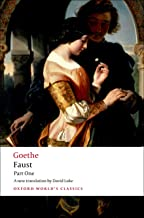
Goethe Faust,
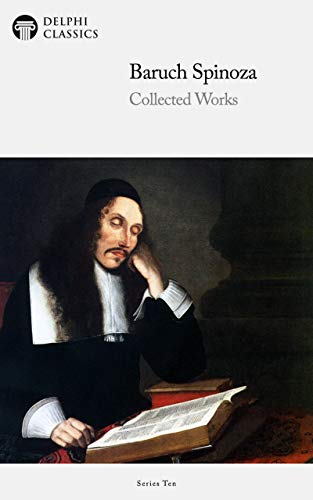
Spinoza,
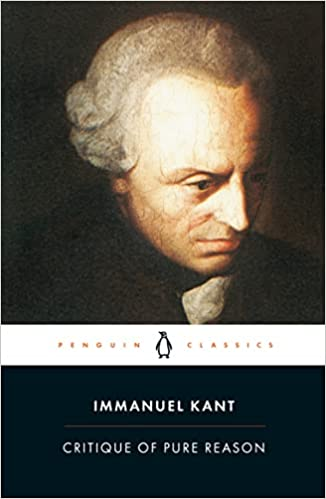
Kant,
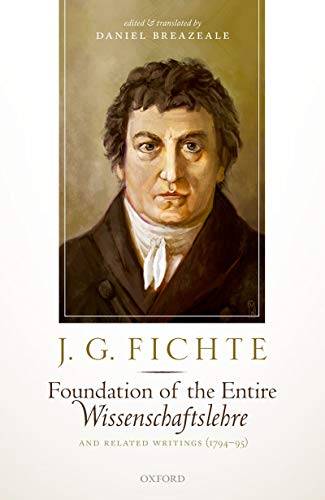
Fichte,
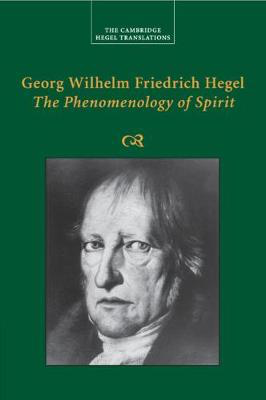
Hegel
Other Interviews: Rousseau, Cohen, Machiavelli, La Mettrie, Smith, Buchner ,Lange, Newton, Berkeley, Hobbes, Locke, Cudworth, Hume, Leibniz, Leporin Erxleben, Fichte, Schiller, Herder, Kierkegaard, Schelling, Kant, Dilthey, Marx, Descartes, Hegel, Schopenhauer, Nietzsche
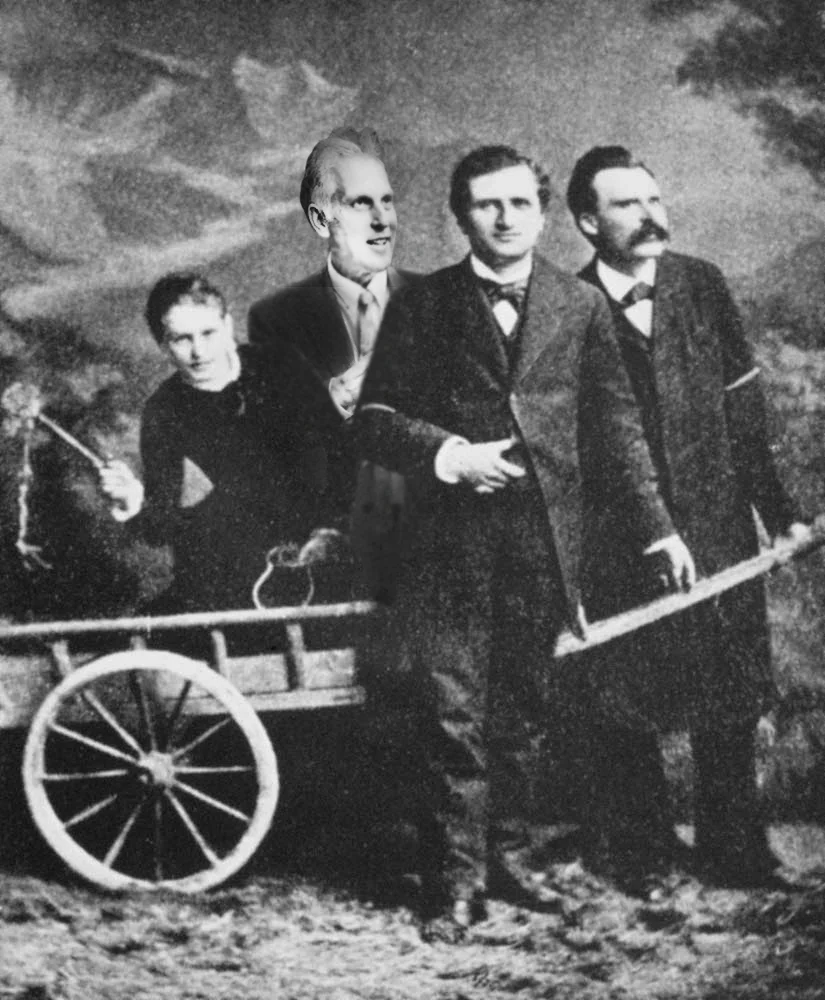
About the Author
Richard Marshall is still biding his time.